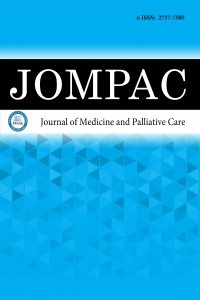1.
Galea S, Nandi A, Vlahov D. The epidemiology of post-traumaticstress disorder after disasters. Epidemiol Rev. 2005;27:78-91.
2.
Ehring T, Razik S, Emmelkamp PM. Prevalence and predictorsof posttraumatic stress disorder, anxiety, depression, and burnoutin Pakistani earthquake recovery workers. Psychiatry Res.2011;185(1-2):161-166. doi:10.1016/j.psychres.2009.10.018
3.
Bromet EJ, Atwoli L, Kawakami N, et al. Post-traumatic stressdisorder associated with natural and human-made disasters in theWorld Mental Health Surveys. Psychol Med. 2017;47(2):227-241.
4.
Cankardaş S, Sofuoğlu Z. Deprem ya da yangin deneyimlemiskisilerde travma sonrasi stres bozuklugu belirtileri ve belirtilerinyordayicilari. Turk J Psychiatry. 2019;30(3):151-156.
5.
Sabuncuoğlu O, Çevikaslan A, Berkem M. Marmara depremindenetkilenen iki ayrı bölgede ergenlerde depresyon, kaygı ve davranış.Klinik Psikiyatri. 2003;6:189-197.
6.
Kardaş F, Tanhan F. Van depremini yaşayan üniversiteöğrencilerinin travma sonrası stres, travma sonrası büyüme veumutsuzluk düzeylerinin incelenmesi. Van Yüzüncü Yıl ÜniversitesiEğitim Fakültesi Derg. 2018;15(1):1-36.
7.
Kuman Tuncel O. Deprem, kitlesel travma ve sonrası.Nöropsikiyatri Arşivi. 2023;60(2):97-98.
8.
Bilici R, Tufan E, Turhan L, Uğurlu GK, Serap T, Kaşan T. Depremsonrasında bireylerin anksiyete düzeyleri ve etkileyen faktörler:Elazığ merkezli bir ön çalışma. Fırat Tıp Derg. 2013;18(1):15-19.
9.
Biçakci AB, Okumuş FEE. Depremin psikolojik etkileri ve yardımçalışanları. Avrasya Dosyası. 2023;14(1):206-236.
10.
Uğur M, Kartal F, Mete B, Tamam L, Demirkol ME. Depremsonrası akut stres bozukluğu olanlarda travma esnasındakiçözülmenin, anksiyete düzeyi, algılanan stres, anksiyete duyarlılığıve deprem stresiyle baş etme ile ilişkisi. 2021;32(4):253-260.
11.
İşikli S, Tüzün Z. Afetlerin akut dönem psikolojik etkilerineyönelik psikososyal müdahale yaklaşımları. Türkiye Klinikleri.2017;2(3):180-188.
12.
Yildiz Mİ, Başterzi AD, Yildirim EA, et al. Deprem sonrasıerken dönemde koruyucu ve tedavi edici ruh sağlığı hizmeti-Türkiye Psikiyatri Derneği uzman görüşü. Turk J Psychiatry.2023;34(1):39-49.
13.
Taşçi GA, Özsoy F. Deprem travmasının erken dönem psikolojiketkileri ve olası risk faktörleri. Cukurova Med J. 2021;46(2):488-494.
14.
Hacıoğlu M, Aker T, Kutlar T, Yaman M. Deprem tipi travmasonrasında gelişen travma sonrası stres bozukluğu belirtilerialt tipleri. Düşünen Adam: Psikiyatri ve Nörolojik Bilimler Derg.2002;15:4-15.
15.
Tanhan F, Kayri M. Deprem sonrası travma düzeyini belirlemeölçeğinin geçerlik ve güvenirlik çalışması. Kuram ve UygulamadaEğitim Bilimleri. 2013;13(2):1013-1025.
16.
Buysse DJ, Reynolds III CF, Monk TH, Berman SR, Kupfer DJ. ThePittsburgh sleep quality index: a new instrument for psychiatricpractice and research. Psychiatry Res. 1989;28(2):193-213.
17.
Ağargün MY, Kara H, Anlar Ö. The validity and reliabilityof the Pittsburgh sleep quality index. Turk Psikiyatri Derg.1996;7(2):107-15.
18.
Çelik AK. Deprem sonrası travma belirtileri, umut ve iyi oluşarasındaki ilişkinin incelenmesi. TRT Akademi. 2023;8(18):574-591.
19.
Bavafa A, Khazaie H, Khaledi-Paveh B, Rezaie L. The relationshipof severity of symptoms of depression, anxiety, and stress withsleep quality in earthquake survivors in Kermanshah. J InjViolence Res. 2019;11(2):225-232.
20.
Sharan P, Chaudhary G, Kavathekar SA, Saxena S. Preliminaryreport of psychiatric disorders in survivors of a severe earthquake.Am J Psychiatry. 1996;153(4):556-558.
21.
Jiang S, Yan Z, Jing P, Li C, Zheng T, He J. Relationships betweensleep problems and psychiatric comorbidities among China’sWenchuan earthquake survivors remaining in temporary housingcamps. Front Psychol. 2016;7:1552.
22.
Sönmez MB. Depremin psikolojik etkileri, psikolojik destek vekorkuyla baş etme. TOTBİD Derg. 2022;21(3):337-343.
23.
Ediz K, Gülbahçe A. Van depremini yaşayan öğrencilerin travmasonrası stres bozukluğu düzeylerinin incelenmesi. AtatürkÜniversitesi Sosyal Bilimler Enstitüsü Derg. 2019;23(3):957-972.
24.
Başoğlu M, Kiliç C, Şalcioğlu E, Livanou M. Prevalence ofposttraumatic stress disorder and comorbid depression inearthquake survivors in Turkey: an epidemiological study. JTraumatic Stress. 2004;17(2):133-141.

